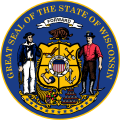References
- ↑ "School Superintendant[sic]" (PDF). Independent American and General Advertiser. Platteville, Wisconsin. November 4, 1848. p. 2. Retrieved April 22, 2010.
- 1 2 3 4 5 6 7 8 9 10 11 12 13 14 15 16 17 18 19 20 21 Anderson, William J. (1929). William A. Anderson (ed.). The Wisconsin blue book, 1929. Madison, Wisconsin: Democrat Printing Company. p. 155. Retrieved June 10, 2008.
- ↑ "State Democratic Nominations" (PDF). The Kenosha Democrat. Kenosha, Wisconsin. November 1, 1851. p. 2. Retrieved April 22, 2010.
- ↑ "Democratic State Nominations" (PDF). Appleton Post-Crescent. Appleton, Wisconsin. November 5, 1853. p. 2. Retrieved April 22, 2010.
- 1 2 3 "The Appointment of Mr. Barry" (PDF). Daily Argus and Democrat. Madison, Wisconsin. June 20, 1855. p. 2. Retrieved April 22, 2010.
- ↑ "Democratic Nominations" (PDF). The Daily Wisconsin Patriot. Madison, Wisconsin. November 2, 1857. p. 2. Retrieved April 22, 2010.
- ↑ "Reform Democratic Ticket" (PDF). The Daily Wisconsin Patriot. Madison, Wisconsin. November 2, 1857. p. 2. Retrieved April 22, 2010.
- ↑ "Republican State Ticket" (PDF). The La Crosse Daily Republican. La Crosse, Wisconsin. November 1, 1859. p. 2. Retrieved April 22, 2010.
- ↑ "General Election Notice" (PDF). The Waukesha Freeman. Waukesha, Wisconsin. October 4, 1864. p. 1. Retrieved April 22, 2010.
- ↑ "National Union Nominations" (PDF). The Waukesha Freeman. Waukesha, Wisconsin. October 25, 1864. p. 2. Retrieved April 22, 2010.
- ↑ "Republican Nominations". Wisconsin State Register. November 2, 1867. p. 2. Retrieved November 29, 2025– via Newspapers.com.
- ↑ Wisconsin Blue Book. 1877. p. 446.
- ↑ Wisconsin Blue Book. 1881. p. 492.
- ↑ Wisconsin Blue Book (PDF). 1882. p. 527.
- ↑ Wisconsin Blue Book (PDF). 1887. p. 483.
- ↑ Wisconsin Blue Book (PDF). 1893. p. 306.
- ↑ Wisconsin Blue Book (PDF). 1895. p. 662.
- ↑ "Harvey, Lorenzo Dow 1848 - 1922". Wisconsin Historical Society. Retrieved November 16, 2011.
- 1 2 3 4 5 6 7 8 9 10 11 12 13 14 Barish, Lawrence S., ed. (2007). "Chapter 8: Statistical Information on Wisconsin". State of Wisconsin Blue Book 2007–2008 (PDF). Madison, Wisconsin: Wisconsin Legislative Reference Bureau. p. 723. ISBN 978-0-9752820-2-1. Archived from the original on August 11, 2011. Retrieved June 7, 2008.
